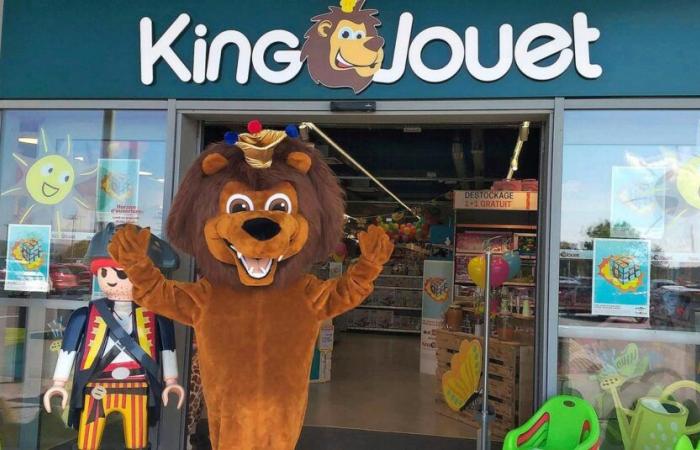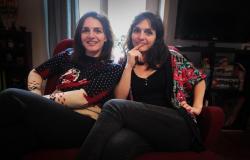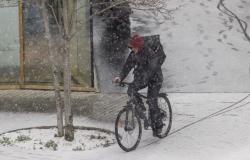Kingtoy, the French brand which took over the Maxi Toys stores, is consolidating its positioning in Belgium and gaining market share despite the challenges facing the sector. The “kidult” trend in particular allows it to stand out.
Kingtoy is above the general market trend,” rejoices Pierre Chalmandrier, international director of the brand specializing in games and toys. In Belgium, the company posted positive growth of 0.6% and maintained its market share target at 0.3 points for the end of December, after having gained 0.2 points this year.
If the month of October was not satisfactory, it is due to consumers’ wait-and-see attitude regarding Black Friday promotions in particular. And the figures prove it since King Cadeau recorded 38% growth for the promotional weekend compared to last year. “Customers waited to buy Saint-Nicolas gifts,” assures Julie Bauduin, marketing manager of King Cadeau.
The games brand is operating in a toy market that is just picking up. Boosted in 2020 and 2021 by the health crisis, toy sales fell by 8% during the first eight months of 2022 and 2023. Today, the decline continues, but in a more moderate manner (-3%), while volumes are slightly increasing again (+1%). In Belgium, the toy market represents 550 million euros per year, according to Circana. Almost half of this turnover is achieved in November and December, around Saint Nicholas and Christmas. “The month of December represents a quarter of our turnover for the year,” confirms Julie Bauduin.
It has been four years since King Cadeau entered Belgium by purchasing the loss-making Maxi Toys stores. Initially, it was decided to maintain the name Maxi Toys in Belgium and Luxembourg, but the company finally changed its name last year in the interests of global market harmonization and communication. “We are King Toy in Switzerland and France, it didn’t make much sense to keep the two brands,” admits Julie Bauduin. “The Belgian market is quite close to that of Switzerland. We have Kingtoy stores there whose commercial concept and organization are the same as in the initial model, but we have retained aspects specific to the country, such as the product offering and especially consumption habits,” adds Pierre Chalmandrier. , international director.
The brand now has 23 stores in Belgium, mainly in Wallonia (three in Brussels and one in Flanders). With Wallonia, France and Switzerland, King Cadeau works mainly in French-speaking territory: an expansion in Flanders is therefore not on the agenda, as it would require different logistics and different advertising campaigns. “For the moment, we want to focus on our existing fleet,” assures Julie Bauduin.
Investments in Belgium
For its change of brand, King Cadeau invested 1.7 million euros in its 23 stores based in Belgium, or between 70,000 and 80,000 euros per establishment. More precisely, part of these funds is allocated to the redevelopment of the 25,000 m² of sales area (from 15,000 to 20,000 euros per store) and to communication (catalogues, multi-channel commercial campaigns, etc.). Added to this are the stocks of goods for a year of activity which require cash flow estimated between 6.5 and 8.5 million euros. Finally, in 2020, the investment for the takeover of Maxi Toys in our country amounted to approximately 2.5 million euros. “This therefore represents a total investment of 10.7 to 12.7 million euros for Belgium,” underlines Julie Bauduin.
“The growing popularity of the ‘kidult’ segment is all the more visible this year, with sales growth of 4 to 12%.”
Julie Bauduin (King Toy)
In addition to transforming all of its stores, King Cadeau is also undertaking to move some. “The positioning of Maxi Toys was not quite similar to ours from a location point of view,” explains Julie Bauduin. The idea is to move stores to locations that generate more traffic in order to improve visibility and increase turnover.” The Jemeppe store, for example, will briefly close its doors to be moved once the ideal location has been found. “We gave all the stores a chance, but this one is particularly poorly positioned and is not taking off despite our investments.”
Among the stores which are progressing the best thanks to the investments made, that of Nossegem (Zaventem) is in pole position, followed by those of Anderlues, Gosselies and La Louvière. One of the best progressions is also recorded by the Nivelles store, whose sales have exploded since investments in toy listing. The company has 10,000 references including own brands, developed internally for price positioning and national brands.
Logistics and Saint Nicholas
The Maxi Toys takeover operation also included the logistics warehouse in Houdeng-Gœgnies (Hainaut), but the company ultimately decided to ensure its supply from France, where King Cadeau has the largest toy warehouse in the world. ‘Europe. “Half of our products are sent directly to stores by suppliers. A proportion that we hope to increase to 60%,” specifies the manager of international activities.
If the brand is French, it intends to adapt to Belgian specificities, like Saint-Nicolas for example. “It is important not to move directly to Christmas,” notes Julie Bauduin. Catalogs are also very important in Belgium, where France has legislated a ban,” adds the manager, who ensures that the products present in the catalogs display a much higher sales conversion rate than others. Besides this, King Toy is also strengthening its network of main suppliers, focusing on innovation, quality and popular licenses.
“Product availability is one of the sector’s other challenges,” adds Julie Bauduin. You have to be able to anticipate what consumers will want to buy.” This year for example, the Stitch wave was the trend. “Disney licenses are generally very profitable,” she assures.
Less innovation
In the Belgian, French and Swiss markets, we observe fewer significant innovations compared to the previous year, where products like the Bitzee phenomenon from Spin Master stood out. Pokémon remain a strong license despite global sales down 20 to 40%, including in Belgium. The only global supplier that stands out is Lego, which is growing by 10 to 30% depending on the country.
“In the top 10 suppliers to the toy industry, Lego unsurprisingly remains at the top of the list thanks to its global reputation, the diversity of its ranges and its popular licenses (Disney, Harry Potter, Super Mario, Star Wars etc. ). Ranges like Lego Technic or Lego Architecture show the brand’s ability to adapt to new technologies and consumer expectations,” adds Pierre Chalmandrier.
Besides Lego, Mattel, with its emblematic brands (Barbie, Hot Wheels and Fisher-Price), and Vtech, pioneer of electronic educational toys, remain major players. Simba Dickie Group, Spin Master, MGA Entertainment (LOL Surprise) complete this top with Clementoni and Ravensburger which stand out in games and puzzles. Finally, Bandai and Epoch are also key suppliers thanks to their Japanese animation-inspired toys and figurines.
Kingtoy operates in an ultra-competitive environment, reinforced by the presence of e-commerce platforms. “This is one of the big challenges in the sector that we have started to take on,” emphasizes Julie Bauduin. A customer’s first instinct is to compare prices on different platforms, so it is essential to be present online, but we want to put this strategy at the service of stores.”
The brand has terminals which allow customers to consult stocks, order and have their package delivered if the product is not available directly in store. Today, e-commerce represents on average 5% of King Cadeau’s turnover and can reach 10% in good months. “We are not going to compete with the platforms,” confesses the manager.
A new axis of development
One of the company’s main areas of growth is in the “kidult” range, a rapidly developing category of toys aimed at adults who are passionate about collections and fun hobbies. “The growing popularity of this segment is all the more visible this year, with sales growth of 4 to 12% compared to the previous year,” explains Julie Bauduin. This is a result higher than the initial objective of 9%. “That does not mean that children are less healthy,” emphasizes the manager. But the ‘kidult’ trend (contraction of kid et adult) allows us to overcome challenges such as the decline in birth rates and the increase in the use of multimedia games.” Objective ? Kingtoy aims for this segment to represent 15% of its total sales in 2025. “There are no typical profiles, it can range from grandparents to young adults.”
Among the leaders in the segment, we find brands like Lego, Bandai and Abysse Corp which offer iconic products. “Lego constructions and popular figurines from franchises like One Piece and Naruto are also among the best-sellers in this category,” adds the manager. “Lego has significant weight on the market and is an essential flow vector in stores,” confirms Pierre Chalmandrier. It is considered the appeal of the toy. Lego succeeds on all levels: at the product, communication and social responsibility level, this supplier targets all age groups, innovates in its products and manages its multi-channel communication well.”
To meet this growing demand, the distributor has invested in in-store referencing, expanded its offering and set up corners dedicated to improve the customer experience. “The optimization of spaces has made it possible to increase the surface area dedicated to products kidult from 20 to 30% in each of the stores, thus improving their visibility,” notes Julie Bauduin. These investments allowed Kingtoy to recover some of the customers who previously came to them for video games.







